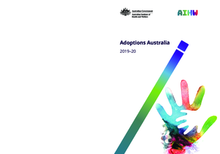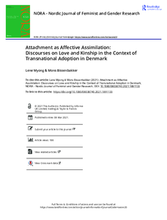Displaying 71 - 80 of 660
The current study assessed the efficacy of the Attachment and Biobehavioral Catch-up intervention for reducing behavior problems in 122 children adopted internationally.
In the present study, the authors explored the adult-child interactions that took place in 116 families from Spain: 28 long-term non-kin foster families, 34 adoptive families, and a community comparison group made up of 54 families.
This study explores issues on post-adoption services in intercountry adoptions based on the perspectives of adoption professionals from Taiwan and Australia.
This paper explores how adoptive parents, with knowledge of exploitation in their own adoptions, are responding emotionally and pragmatically.
Adoptions Australia 2019–20, the 30th report in the series, covers the latest data on adoptions of Australia children and children from overseas, and highlights important trends in the number of adoptions dating back to 1995–96.
The current study aimed to examine effects of pre-adoptive risk on long-term functioning in children adopted from foster care.
The current study aimed to examine effects of pre-adoptive risk on long-term functioning in children adopted from foster care.
This study uses a constructivist approach to analyse narrative interviews with a sample of Taiwanese intercountry adoptees in Australia ranging in age from early to middle adulthood.
This research focuses on Somalis living in a large English city where there is a significant shortage of Somali foster carers and adopters despite people of Somali heritage comprising a sizeable proportion of the care and city population.
This article attempts to initiate a critical dialogue on the politics of love and attachment by investigating the way in which the concept of attachment governs the field of transnational adoption.


